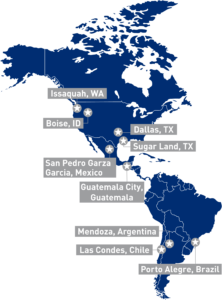
Data-certified cities attract more resources, says Bloomberg
17 June 2024
by Jonathan Andrews
Nine cities from the US and Latin America have been recognised for establishing data capabilities to inform policy, allocate funding, improve services, evaluate programmes, and engage residents.
The cities–including Dallas, Texas, Porto Alegre in Brazil, Guatemala City, and Mendoza in Argentina–were awarded the Bloomberg Philanthropies and Results for America What Works Cities Certification.
The organisation says that winning cities are in a better position to make the most of federal recovery funding from the American Rescue Plan.
“Mayors have told us that achieving certification boosts their credibility with residents, helps recruit city staff, showcases their achievements, and provides a clear direction and strategy for meeting city goals,” Rochelle Haynes (pictured), Managing Director of What Works Cities Certification, told Cities Today. “[Additionally], the Mathematica report highlights how certification is also helping mayors bring resources back to their cities.”
She recognised that cities are becoming more transparent with their data via open data portals, which build trust with residents and creates a system of accountability. This is coupled with a concerted effort to engage the community —cities are actively and routinely seeking input from residents to inform decision making and that this blend of quantitative and qualitative data is making city programmes more responsive and inclusive, while building trust.

“Since 2015, we’ve seen some exciting trends in how cities use data,” she said. “More city leaders are committed to using data-informed and evidence-based practices to develop policies, design programmes and allocate funds.”
Highlights of how newly certified cities are using data and evidence include:
- Dallas, Texas (Silver) disaggregated data to inform budget decisions that address inequities based on race and income, resulting in all 42 city departments contributing to the allocation of US$40 million of equity investments and establishing 220 metrics that are tracked publicly.
- Mendoza, Argentina (Silver) strengthened urban waste management by harnessing artificial intelligence to map over 1,500 tags that identified micro-dump sites, reduced environmental impact, and focused clean-up efforts for 19 neighbourhoods, improving quality of life for 2,000 households.
- Porto Alegre, Brazil (Silver) expanded digital infrastructure to create 45 internet access points which reduced the city’s resident request backlog by 79 percent and increased the number of municipal financial documents issued online by 49 percent.
Earning a certification also means those winning cities become part of the Certification Community – a network of over 1,400 local leaders who can share ideas and best practices.
The programme is open to any city in North, Central, or South America with a population of 30,000 or more. The next round of applications, including an online self-assessment, must be submitted by 15 July.
Image: What Works Cities








